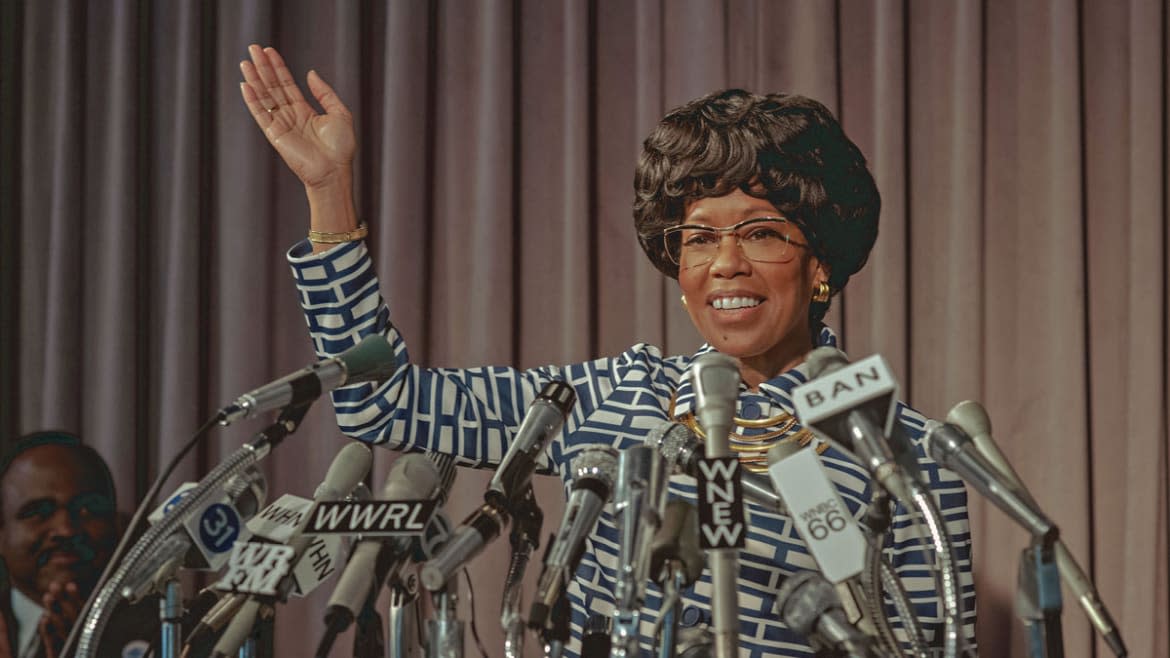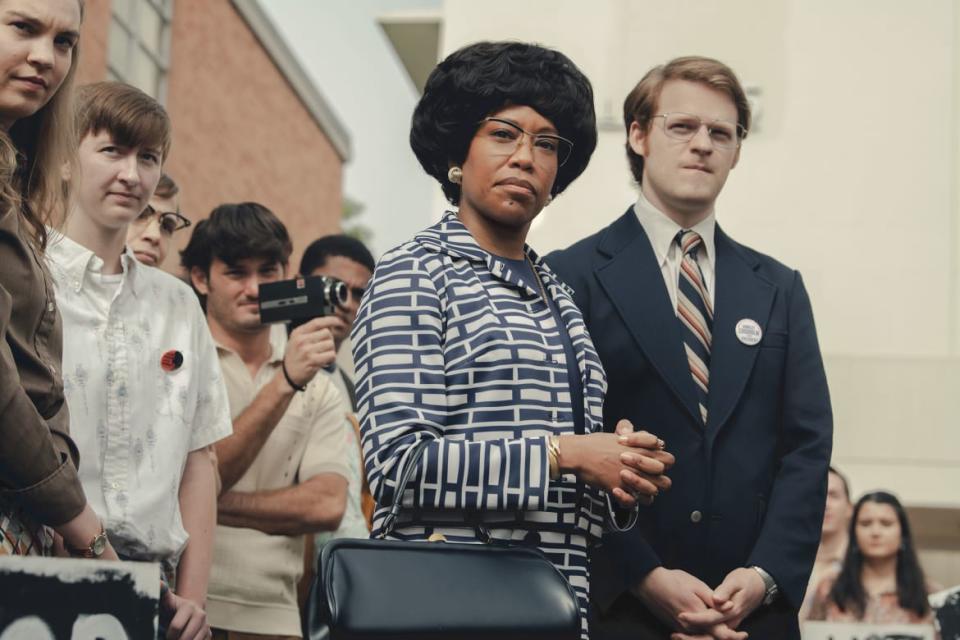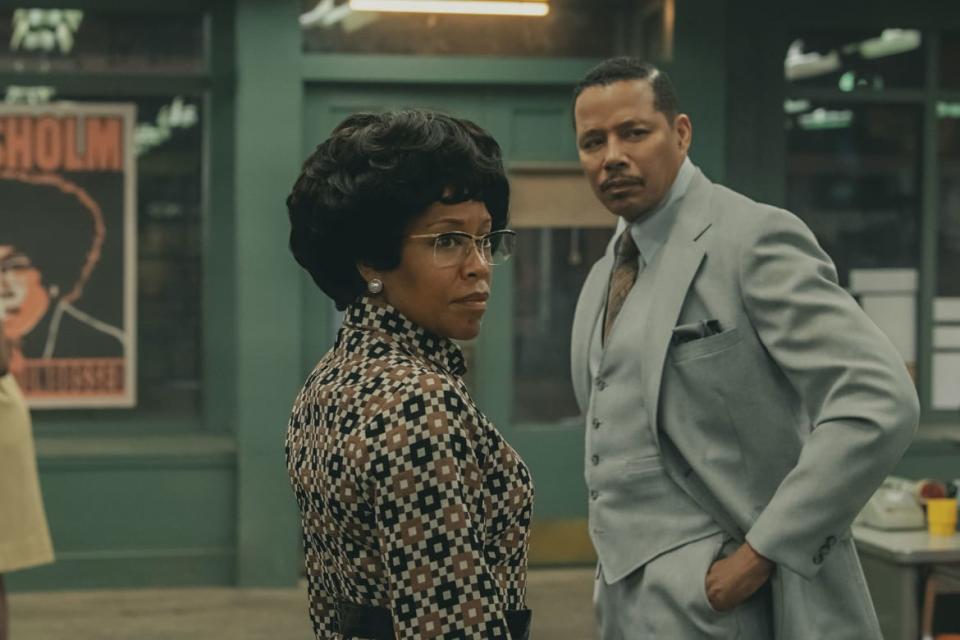Surely There’s a Better Shirley Chisholm Biopic Than ‘Shirley’

- Oops!Something went wrong.Please try again later.
“Remarkable” almost doesn’t feel like a big enough word to quantify Shirley Chisholm. The Brooklyn-born politician was not only the first Black woman ever to be elected to United States Congress, but also the first Black woman to ever have a real, conceivable shot at the American presidency, earning a considerable amount of primary election votes and presidential delegates along the way. And though she ultimately did not win the Democratic party’s nomination in 1972, Chisholm’s bid for the presidency was momentous and impactful, paving the way for countless other politicians intent on making real change to an unvarying system.
Such an extraordinary legacy merits an equally exceptional movie, but Shirley, which streams on Netflix March 22, is far from the phenomenal biopic that Chisholm deserves. The film is frustratingly myopic, focusing solely on Chisholm’s presidential run, instead of probing the full life of its accomplished subject. This narrow account inadvertently diminishes Chisholm’s broad influence, keeping its audience at a distance when Chisholm’s undaunted spirit should be sweeping us up. But perhaps worst of all is that it’s not the vehicle it could be for star Regina King, whose portrayal of Chisholm feels more like a decent imitation than a potent piece of character work. Shirley is messy, makeshift, and pedantic, as though it weren’t a film but a cobbled-together starter kit for political history beginners.
Granted, everyone’s got to start somewhere when it comes to the vast expanse of American politics. But Shirley doesn’t serve as a compelling enough jumping-off point for any political science newbies to get hooked on the subject. The film hurries through a brief rundown of Chisholm’s political history, beginning with her election to Congress in 1968. She and the other members of the 91st Congress pose for a group photo on the steps of the Capitol, just next to a massive green screen rendering of the building. It’s not surprising that the production couldn’t get clearance to film at the actual United States Capitol, but seeing this shot—just two minutes into the movie—is an unfortunate omen of Shirley’s mystifying stylistic construction.

The film is backlit to the hilt, washing out its characters in nearly every shot, and its muted color palette does little to contribute to the movie’s visual vibrancy. A film about Chisholm’s most notable political accomplishment should warrant an appealing aesthetic. But the decision to fill the screen with muted, predictable 1970s earth tones and dull color grading keeps Shirley hindered by a stagnancy its subject never suffered. What’s more, the anamorphic lenses the film is shot with make several frames look downright silly—even if they are in line with the way so many other Netflix originals are filmed. Does Shirley Chisholm’s overdue, star-studded biopic really need to be shot like The Witcher? The film’s inane visual palette distracts from the talent on display and the story’s political zeal, making Chisholm look like she’s about to battle Scott Pilgrim, not fight for the future of America.
That puzzling mode of filmmaking could be forgivable if writer-director John Ridley’s script was more persuasive than his direction. But Shirley’s chronological timeline represents the worst tendencies that filmmakers have when constructing biopics. Following Chisholm’s campaign for president—which, again, is just a fascinating yet brief blip in a larger political legacy—from beginning to end is tiresome. Describing the intricacies of the plot would be to take an erudite approach to Chisholm’s Wikipedia page. It’s difficult to expand upon any of the film’s beats because the movie is simply so formulaic, which is precisely why it’s so baffling. Ridley prefers to hop along the sequential headlines in Chisholm’s presidential run, never taking enough time to peer at the woman he’s studying. We rarely get the introspection we crave; instead, Ridley is content with serving up banal moments of racist and sexist derision from the media and Chisholm’s fellow candidates, expecting the viewer to determine how this might affect Chisholm’s mindset rather than showing us its impact.
‘Palm Royale’ Is Kristen Wiig’s Best Work Since ‘Bridesmaids’
There are hints of Chisholm’s interiority here, but they are merely passing glimpses. We see her seated in silence, facing away from the camera, digesting news for just a moment. We catch her stalwart determination starting to fire its cylinders, only for Ridley to cut away to the next scene, taking the power King was just beginning to exhibit on screen with him. Even King, who has the chops to make this into a career-defining role, can’t seem to figure out what to do with her character. Her portrayal is all over the map, with Chisholm’s slight Bajan-Brooklyn accent causing King to slip when she should soar. King seems preoccupied with nailing the right dialect, and that fixation keeps her from delivering her dialogue with much potency. Still, she is the glue that holds this film together, an engrossing enough presence on camera to maintain an audience’s interest regardless.
Other characters are faced with the same fate under Ridley’s direction. Terrence Howard has little to do as community leader Arthur Hardwick, Jr.—who married Chisholm after her bid for the presidency—other than shoot a few loving glances toward King. The late, great Lance Reddick spends one of his final roles, as political organizer Wesley Holder, dictating the importance of outreach in Chisholm’s campaign, which Ridley never manages to convey in the film.
Biopics are a tough genre to nail, and there are far more middling ones than there are memorable ones. Filmmakers are tasked with finding the right balance between telling viewers about history and showing its impact, and Ridley buckles under that pressure right out of the gate. Hard-won victories in Chisholm’s campaign don’t feel celebratory, and setbacks—along with her eventual resignation from the presidential race—aren’t emotionally impactful. The film cant even be called tonally uneven, because it doesn’t have a tone to begin with. It is simply a series of events, playing out in sequence. King does her damnedest to bring as much rich character depth to this thinly written portrayal of Chisholm, but even an actor as massively talented as her can’t rescue a floundering script. At times, it almost hurts to watch Shirley fall back on more mawkish sentimentality when it should be aiming to fire up a new generation of young American voters.

We simply have to ask more of our biopics. It is not enough to cast a few great actors and supply them with a mediocre script. There should be reasons for telling a story when it’s being told, and, especially in the case of Chisholm, an effort to underline precisely why her history-making political tenure remains so important. For a passion project, Shirley is mysteriously lacking in enthusiasm, never reaching the heights of Uzo Aduba’s wonderful Emmy-winning portrayal of Chisholm in 2020’s Mrs. America.
In its final 11 minutes, Shirley finally manages to find some emotional center. But that brief resonance quickly dissipates to make way for a jarring ending that only affirms the film’s tepid aspirations. I haven’t seen a biopic more ready-made to be shown in high school history classes on the Wednesday before Thanksgiving, when both teachers and students are already checked out. Shirley is merely a piece of the curriculum, a broad and unsatisfactory depiction of an undervalued political powerhouse. While this story’s existence on a massive platform is certainly vital, whether or not viewers make it past the first hour awake is another story altogether.
Get the Daily Beast's biggest scoops and scandals delivered right to your inbox. Sign up now.
Stay informed and gain unlimited access to the Daily Beast's unmatched reporting. Subscribe now.

